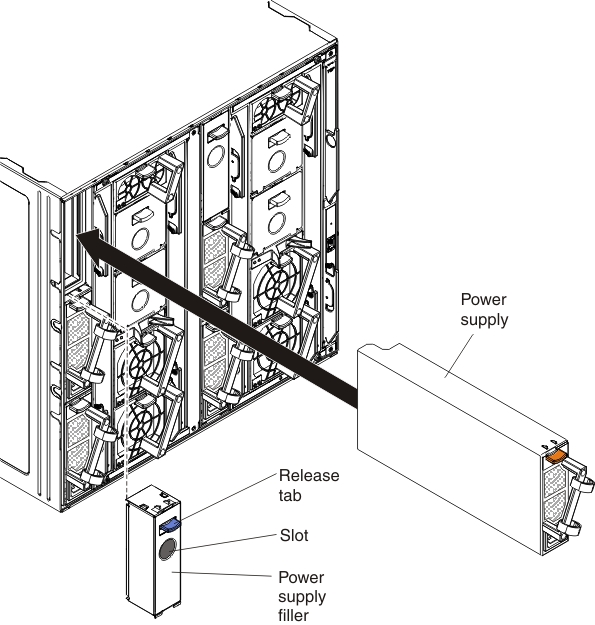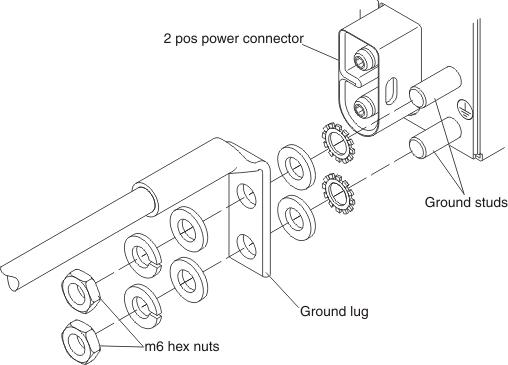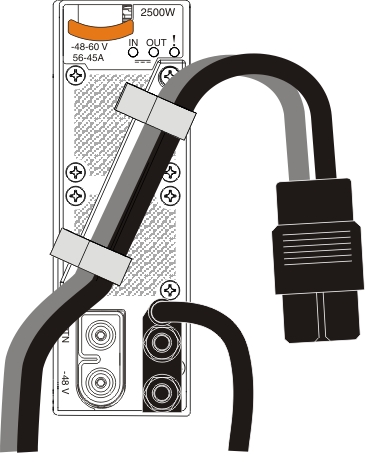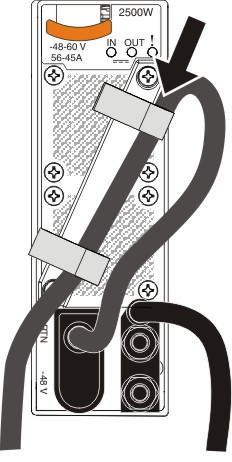Replacing a power supply
Use these instructions to install a power supply in the Flex System Carrier-Grade chassis. You can install a power supply while the Flex System Carrier-Grade chassis is powered on.
Statement 31
DANGER
danger
Electrical current from power, telephone, and communication cables is hazardous.
To avoid a shock hazard:
- Do not connect or disconnect any cables or perform installation, maintenance, or reconfiguration of this product during an electrical storm.
- Connect all power cords to a properly wired and grounded power source.
- Connect to properly wired power sources any equipment that will be attached to this product.
- When possible, use one hand only to connect or disconnect signal cables.
- Never turn on any equipment when there is evidence of fire, water, or structural damage.
- Disconnect the attached ac power cords, dc power sources, network connections, telecommunications systems, and serial cables before you open the device covers, unless you are instructed otherwise in the installation and configuration procedures.
- Connect and disconnect cables as described in the following table when you install, move, or open covers on this product or attached devices.
| To Connect: | To Disconnect: |
|---|---|
|
|
Statement 34
CAUTION
To reduce the risk of electric shock or energy hazards:
- This equipment must be installed by trained service personnel in a restricted-access location, as defined by the NEC and IEC 60950-1, First Edition, The Standard for Safety of Information Technology Equipment.
- Connect the equipment to a properly grounded safety extra low voltage (SELV) source. A SELV source is a secondary circuit that is designed so that normal and single fault conditions do not cause the voltages to exceed a safe level (60 V direct current).
- Incorporate a readily available approved and rated disconnect device in the field wiring.
- See the specifications in the product documentation for the required circuit-breaker rating for branch circuit overcurrent protection.
- Use copper wire conductors only. See the specifications in the product documentation for the required wire size.
- See the specifications in the product documentation for the required torque values for the wiring-terminal screws.
Attention
The following circuit breaker and ground cable ratings apply to -48 V dc power supplies only:
| Breaker | Listed 70 A | See Note 1 |
| Ground cable | 4 AWG with Listed lug which can accept M6 ground screws | See Note 2 |
| Torque rating for ground screws | 4.0 - 4.8 Newton-meters (35.4 - 42.5 inch-pounds) | - |
| ||
Important
- Do not mix different types of power supplies in the Flex System Carrier-Grade chassis.
- Each chassis must contain either all dc-powered supplies or all ac-powered supplies.
- Make sure that the power cord is not connected to the power supply when you install the power supply in the chassis.
- Do not remove the plastic strain-relief ties from the rear of the power supply.
To install a power supply, complete the following steps.

Give documentation feedback


